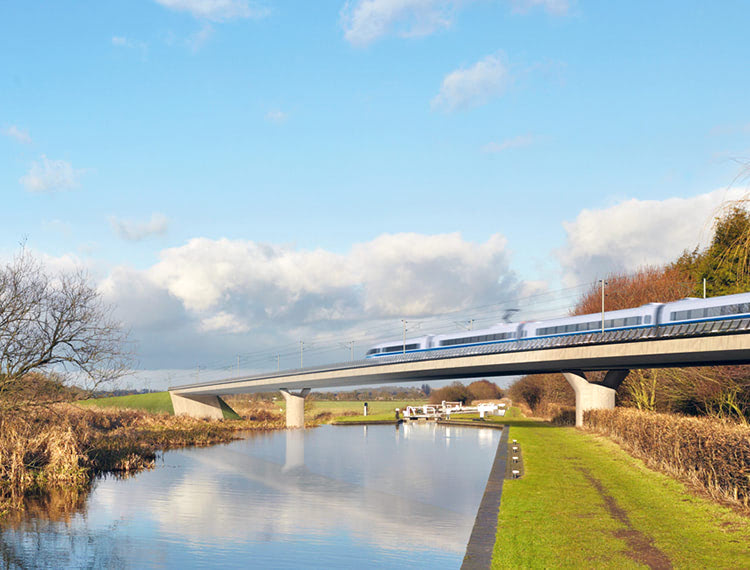Transport Secretary Chris Grayling today (1 Nov) paved the way for a huge new UK train programme by telling bidders new HS2 trains must deliver jobs and skills in Britain.
HS2 Ltd will tomorrow name the five shortlisted firms seeking to win the multi-billion pound contract to build some of the fastest trains in the world.
The Transport Secretary told companies in the race to be awarded the £2.75 billion contract to show how “huge opportunities” for British workers will be provided in their bid to build Britain’s fastest trains.
 Chris Grayling said:
Chris Grayling said:
“I am determined to see the great HS2 train building programme create huge opportunities for British workers and drive economic growth in our country.
“Bidders need to push the boundaries and I want to see innovation and ambition in their plans to build the fastest trains in Britain – which I want to pave the way for a new generation of highly skilled British workers, boosting skills, generating employment and strengthening the manufacturing supply chain.
“Britain’s new railway will carry more than 300,000 people a day, improve connections between our great cities, free up space on our existing rail lines, generate jobs and help us build an economy that works for all. But it is crucial that the benefits of HS2 resonate far beyond the opening of the new railway.”
The new 225mph trains will provide a world-class passenger experience, while also meeting the highest international standards for noise reduction and environmental sustainability.
Starting from 2026, the trains will bring the benefits of high speed rail not only to the core network between London and the West Midlands, but also onward to places like Manchester, Glasgow, Liverpool, Preston and Wigan. The successful bidder will maintain the fleet from the dedicated depot planned for Washwood Heath in Birmingham, which will also be home to the HS2 Network Control Centre – together creating hundreds of skilled jobs.
The announcement comes after the opening of the new National College for High Speed Rail in Birmingham and Doncaster and after work began on Phase One of the project to connect London and Birmingham.
HS2 Ltd will now continue to work with the shortlisted bidders and potential UK suppliers to create opportunities, boost skills and encourage a wide range of people to join the HS2 workforce.
In total, construction of the full HS2 route to the north-west and Yorkshire will create up to 25,000 jobs and 2,000 apprenticeships. Another 3,000 people will operate HS2 and it is estimated that growth around new HS2 stations will create another 100,000 jobs.
Invitations to tender are expected to be issued to shortlisted bidders in spring 2018 with contract award following in late 2019. A further competition will be run to provide trains for the second phase of the project which is due to commence services in 2033.
The Government is delivering the biggest rail modernisation programme for over a century and is determined to see Britain’s train building sector go from strength to strength. Rail industry leaders have forecast that thousands of new state-of-the-art trains will be rolling off UK production lines over the coming years.
Hitachi Rail Europe’s manufacturing facility in Newton Aycliffe, County Durham, is building more than 100 Intercity Express trains which will be rolled out across the Great Western and East Coast lines over the next three years.
And earlier this year it was announced Derby’s Bombardier had secured a multi-million pound investment to build 90 new trains for South Western passengers. The trains will be based on the Bombardier Aventra platform, which is also being used for the 70 new trains for Crossrail – which is due to open in 2018 as the Elizabeth Line – and for new trains for the London Overground and East Anglia.
There are also commitments from other manufacturers to make substantial investments in facilities in Britain with Alstom developing their new train technology and manufacturing facility at Widnes and CAF manufacturing in Newport.
HS2 will also bring benefits including faster journey times to Scotland. Under Phase One of HS2, between London Euston and Birmingham, journeys from London to Glasgow will fall to under four hours. By 2027, and the opening of the expansion of the network to Crewe, the journey between Glasgow and London will be reduced by 45 minutes compared to today.
HS2 will also mean that by 2033 journey times between London and Glasgow and Edinburgh will be reduced to around three hours and 40 minutes.

 Chris Grayling said:
Chris Grayling said:
 Chris Grayling said:
Chris Grayling said:
Responses